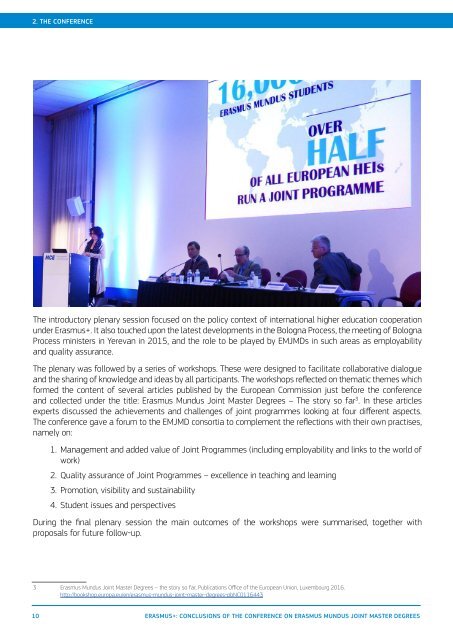Erasmus+
2kWLqbT
2kWLqbT
You also want an ePaper? Increase the reach of your titles
YUMPU automatically turns print PDFs into web optimized ePapers that Google loves.
2. THE CONFERENCE<br />
2.1. PLENARY SESSIONS<br />
2.1. PLENARY SESSIONS<br />
The plenary speakers represented the Cabinet of Commissioner Tibor Navracsics for Education, Culture, Youth<br />
and Sport, the Commission’s Directorate General for Education, Audiovisual and Culture, and the Education,<br />
Audiovisual and Culture Executive Agency, including the Eurydice network. They extended a warm welcome to<br />
all participants, while outlining the achievements of Erasmus Mundus, its prestige and its prospects for future<br />
growth.<br />
The conference heard in some detail of the contribution that Erasmus Mundus had made to the Bologna<br />
Process, notably in terms of mobility instruments, as well as the role that it could play in the development<br />
of quality assurance at European level and in the promotion of employability. The speakers indicated that<br />
national governments, too, had a role to play – in assisting the promotion and funding of Erasmus Mundus,<br />
but above all in adapting their legal frameworks in such a way as to facilitate the recognition of its awards.<br />
All the speakers welcomed feedback from the conference on policy development and programme design,<br />
particularly in respect of the ‘jointness’ and the sustainability of the joint degree courses.<br />
The introductory plenary session focused on the policy context of international higher education cooperation<br />
under <strong>Erasmus+</strong>. It also touched upon the latest developments in the Bologna Process, the meeting of Bologna<br />
Process ministers in Yerevan in 2015, and the role to be played by EMJMDs in such areas as employability<br />
and quality assurance.<br />
The plenary was followed by a series of workshops. These were designed to facilitate collaborative dialogue<br />
and the sharing of knowledge and ideas by all participants. The workshops reflected on thematic themes which<br />
formed the content of several articles published by the European Commission just before the conference<br />
and collected under the title: Erasmus Mundus Joint Master Degrees – The story so far 3 . In these articles<br />
experts discussed the achievements and challenges of joint programmes looking at four different aspects.<br />
The conference gave a forum to the EMJMD consortia to complement the reflections with their own practises,<br />
namely on:<br />
1. Management and added value of Joint Programmes (including employability and links to the world of<br />
work)<br />
2. Quality assurance of Joint Programmes – excellence in teaching and learning<br />
3. Promotion, visibility and sustainability<br />
4. Student issues and perspectives<br />
During the final plenary session the main outcomes of the workshops were summarised, together with<br />
proposals for future follow-up.<br />
3 Erasmus Mundus Joint Master Degrees – the story so far, Publications Office of the European Union, Luxembourg 2016.<br />
http://bookshop.europa.eu/en/erasmus-mundus-joint-master-degrees-pbNC0116443<br />
10 ERASMUS+: CONCLUSIONS OF THE CONFERENCE ON ERASMUS MUNDUS JOINT MASTER DEGREES<br />
ERASMUS+: CONCLUSIONS OF THE CONFERENCE ON ERASMUS MUNDUS JOINT MASTER DEGREES<br />
11


